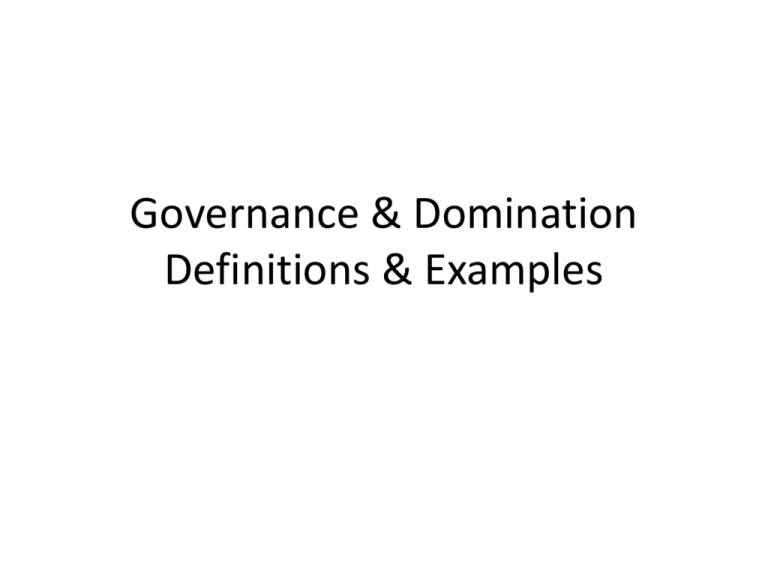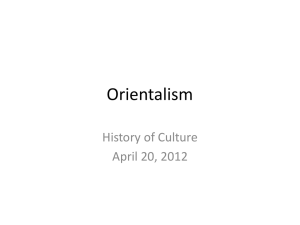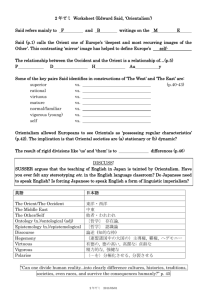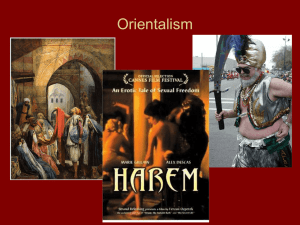Governance & Domination Definitions
advertisement

Governance & Domination Definitions & Examples Imperialism • “Superior” country’s/force’s economic, political, territorial and/or sociocultural control over an “inferior” country through subjugation/violence for resources, such as raw materials, capital and human labor. New-Imperialism • Cultural imperialism • Media imperialism • Covert project/process for economic, political, cultural control Colonialism • Dominant power conquers a “weak/inferior” region and settles there—establish institutions such as government, bureaucracy, militarized force, industry— to expand territorially and conduct imperial business for an extended period of time. • The dominant power’s population doesn’t fully (may partially) assimilate but affects local culture by introducing aspects of their own culture, affecting religious practice (conversion, syncretism), labor, changes to economic (currency) system, legislation, language, education, leisure, social dynamics (gender roles). Post-Colonialism • State after decolonization • Dismantling of colonialist institutions (mimicry/alterity) • Development Decolonization • The ridding of colonial power Neo-colonialism • Covert form of colonialism Psychology of Domination • “The longstanding rationale that the ‘superior’ cultures associated with imperial powers were necessary and beneficial to the ‘inferior’ cultures they controlled” (Ritzer:65) • “Without the doxa-esque sense that Middle Easterners are not like ‘us’ and don’t share ‘our’ values, there would have been no war. Othering was necessary to decimate them—to kill them in order to teach them we’re superior.” (Said: xx-xxi) • Noam Chomsky http://www.youtube.com/watch?v=Pis5f085P3M Self v Other • The definition of the Other as different than (opposed to) the self constitutes the Self • Enables the domination/subordination of peoples • Political, economic, social, psychological implications • Alterity: The construction of cultural Others (Taussig) Self v Other, West v East • This process of collapsing the ontological and epistemological has enabled the West to define itself as a contrast to the Other, the East. According to Said, writers, “poets, novelists, philosophers, political theorists, economists, and imperial administrators,” have willfully accepted the terms East and West, Orient and Occident, and thus further reify the terminologies (2). “The Orient is an idea that has a history and a tradition of thought, imagery, and vocabulary that have given it reality and presence in and for the West” (5). Orientalism (Said) • Foundational text/theory in post-colonial studies • The Orient is not an “inert fact of nature” but “was almost a European invention” (1) • Meanings of Orientalism: 1. 2. 3. 4. • Mode of scholarly study, thought, practice Style of thought: Ontological and epistemological Western style for dominating, restructuring, and having authority over the Orient Something historically and materially defined 3 qualifications for the discourse of Orientalism: 1. 2. 3. The Orient isn’t not real. It’s not just an idea. Ideas, cultures and histories cannot be understand or studied without their force, or more precisely their configurations of power. Can’t assume that Orientalism is just a structure of myths Violence (Fanon) • Foundational theorist in post-colonial studies • Dehumanization: destructive, detrimental to mental health • Analyses supported by Lenin’s statement that imperialism is a degenerate form of capitalism, which requires greater degrees of human exploitation to ensure growth • “Decolonization is an always violent historical process; the replacing of a certain species of men with another species of men.” (79). • Decolonization is the meeting of two forces, opposed to each other by their very nature (79). • Solution/catharsis: Violent resistance Structural violence • Form of violence where some social structure or system may harm people by preventing them from meeting their basic needs; leading to social inequality • Examples: elitism, ethnocentrism, heterosexism, nationalism, racism, sexism… • Structural violence and direct violence are highly interdependent. • The anarchist anthropologist David Graeber believes bureaucracy is a form of structural violence and that structural violence always holds the threat of direct physical violence. Resistance • “Literary texts can be used as a way of exercising cultural control over the ‘natives’…[or] can be subverted by those who oppose the colonial power and can be used to help bring down its regime” (Ritzer:70). • Détournement, mimicry, hijacking, culture jamming Shift in Systems of Punishment • http://web.ics.purdue.edu/~felluga/punish.ht ml Governmentality • A pervasive logic or technology of rule that socially organizes/directs society through myriad everyday ways of life • State employs governmentality to reach its own ends but governmentality reaches beyond the state • Dualism between state and society (superstructure and base) Biopower and Anatomo-Politics • Strategies of power to govern a population through biopolitics and anatomo-politics to maximize human potential • Biopolitics: Expert knowledge • Anatomo-politics: Technologies of power that act upon the individual (body, soul) to discipline/manage subjects. Tools for selfgovernance Subjectivities • Being a subject: collapse of the ontological (theory of being/existence) & epistemological (theory of knowledge/ways of knowing) Foucault’s Four General Rules 1. 2. 3. 4. • The power exercised upon the body need not be violent or as property, but rather can be subtle and strategic. Foucault refers to the knowledge and the mastery of this subtle strategy as the political technology of the body (26). Foucault’s notion of the body politic refers to the material elements and techniques that subjugate bodies by turning them into objects of knowledge (28). Foucault stresses that this power exerts pressure upon those “who do not have it; thus the power is transmitted by them and through them…this means that these relations go right down into the depths of society” (27). By this definition, the prisoners—or all those subjugated by this power—are contributing to their own subjugation and reproducing the hegemony of those in power.








